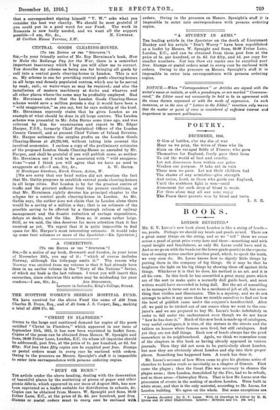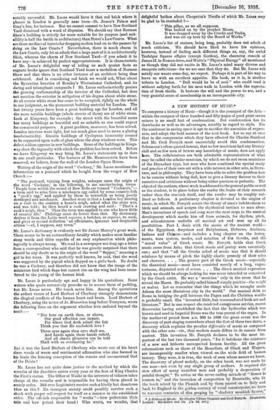BOOKS.
LONDON REVISITED.•
Mn. E. V. LUCAS'S new book about London is like a string of beads— no, pearls. Perhaps we should say beads and pearls mixed. There are a great many things on the string, and as we " tell " them we come across a pearl of great price every hero and there—something said with equal insight and fancifulness, as only Mr. Lucas could have said it. And so we go on with the beads (or the lower-grade pearls) in the expecta- tion of coming across another priceless pearl, which, to speak the truth, we very soon do. Mr. Lucas knows how to dignify little things by putting them in the company of big things. Or it may be that he heightens the light on his big things by showing them off against little things. Whichever it is that he does, his method is an art, and it is all his own. In this book he has assembled a great many parts which are of the sort to make quite a normally dull guide-book, and most writers would have succeeded in being dulL But the art of assembling as he manages it turns out not to be a mechanical job at all, but some- thing that vivifies and illuminates. This is a mystery, and wo do not attempt to solve it any more than we trouble ourselves to fmd out how the bowl of goldfish came under the conjurer's handkerchief. After all, we paid to be tricked out of our senses when we went to the con- jurer's. and we aro prepared to buy Mr. Lucas's books indefinitely in order to fall under the enchantment oven though we do not know " how he has done it." Much of this new book is made up of catalogues, very useful catalogues, it is true, of the statues in the streets and the tablets on houses where famous men lived, but still catalogues. And yet they are not dull things. Each row of beads always has the pearl somewhere in its neighbourhood. Again, we think we remember some of the chapters in this book as having already appeared in various journals. Then they did not seem to be particularly about London, but now they are obviously about London and slip into their proper places. Something has happened here. A touch has done it.
Mr. Lucas's account of how Wren came to give his glorious series of churches to London reads as inevitably as a chapter of Genesis. First; came the plague ; then the Great Fire was necessary to cleanse the • plague areas ; then London, demolished by the Fire, had to be rebuilt, and so there arose—Christopher Wren. That is how Mr. Lucas seas the procession of events in the making of modern London. Wren built in white stone, and that is the only material, according to Mr. Lucas, for London building. We agree on the whole. But some exceptions are • Lyndon Revisited. By E. V. Lucas. With 16 Drawings in Colour by R. 11. Livens and 16 other Illustrations. London : Methuen and Co. Os. net.) notably successful. Mr. Lucas would have it that red brick where it piesses in London is generally near trees—St. James's Palace and Gray's Inn, for instance. But we cannot consent to have New Scotland Yard dismissed with a word of dispraise. We should say that Norman Shaw's building is strictly far more suitable for its purpose (and suit- felinity is half the battle in architecture) than Street's Law Courts. What are those mediaeval turretsfor dropping molten lead on to the passers-by doing on the Law Courts f Nevertheless, there is much charm in the Law Courts, only let us admit that a large part of it is architecturally illicit, whereas the charm of New Scotland Yard—if you admit it to have any—is achieved by perfect appropriateness. It is characteristic of Mr. Lucas's delightful way of telling us such quaint facts as cognate -books ignore that Scotland Yard bears a medallion of Norman Shaw and that there is no other instance of an architect being, thus celebrated. And in considering rod brick we would ask, What about the Byzantine beauties of Bentley's Westminster Cathedral, and its daring and triumphant campanile ? Mr. Lucas enthusiastically praises the growing craftsmanship of the interior of the Cathedral, but does not mention the exterior in mitigation of his dogma about white stone. At all events white stone has come to be accepted, rightly on the whole in our judgment, as the permanent building material for London. The rest twenty years have been a great building age for London, and all the more notable buildings (whole streets of them) are of white stone. Look at Kingsway, for example ; the street with the beautiful name has many buildings as beautiful and as suitable as one could expect for commercial purposes. A great problem, moreover, has been solved. London interiors want light, but too much glass used to mean a glaring insubstantiality. Granite buildings of Cyclopean immensity seemed to be supported upon walls of glass where the shop windows were. This defect seldom appears in new buildings. Some of the buildings in Kings- way show the ingenuity with which the problem has been solved. Before we leave Kingsway we may bring Mr. Lucas's statements up to date In one small particular. The features of Mr. Hammerstein have been removed, we believe, from the wall of the London Opera House.
Writing of the origin of the word " Cockney," Mr. Lucas mentions the Information on a postcard which he bought from the verger of Bow Church
" The postcard, turning from weights, enlarges upon the origin of the word Cockney,' in the following, to me unconvincing, terms. People born within the sound of Bow Bells are termed " Cockneys,"— a term said to arise from a misshapen egg called by some country-folk a " cock's egg," and applied by them to townsfolk as being poorly developed and misshapen. Another story is that a London boy hearing on a visit to the country a horse's neigh, asked what the noise was, and was told ; he then heard a cock crowing and said : " That's a cock's neigh, then." Thus the term was applied to one who knew little of country life.' Philology must do better than that. My dictionary derives it from the Latin word coquina, a butcher, or coqutno, to cook, and gives as second definition an effeminate, ignorant and despicable citizen '—oft I suppose, any town."
Mr. Lucas's dictionary is evidently not Sir James Murray's great work. There seems to be an extraordinary fatality which makes most familiar slang words and titles capable of an easy explanation which philo- logically is always wrong. We read in a newspaper not long ago a letter from a correspondent who said that he was greatly surprised that there should be any doubt as to the origin of the word " flapper," meaning a girl in her teens. It was perfectly well known, he said, that the word was suggested by the pigtail which flapped on a girl's back. No doubt he was a Cockney, and therefore did not know that the image of the miniature bird which flaps but cannot rise on the wing had been trans- ferred to the young of the human kind.
Mr. Lucas is particularly apt and happy in his quotations. Some writers who quote extensively provoke us to accuse them of padding, but Mr. Lucas never. His touch saves him. Among the quotations the ardent verses of Lord Herbert of Cherbury strangely demonstrate the illogical conflicts of the human heart and brain. Lord Herbert of Cherbury, using the metre of In Memoriam long before Tennyson, wrote the following lines on the argument whether love endured beyond the tomb :—
" Nor here on earth then, or above, Our good affection can impair, For where God doth admit the fair Think you that Ho exeludeth love ?
These eyes again then eyes shall see, And hands again these hands enfold, And all chaste pleasures can be told Shall with us everlasting be."
But it was the Lord Herbert of Cberbury who wrote out of his heart these words of warm and sentimental affirmation who also formed in his brain the freezing conception of the remote and unconcerned God of the Deists I
Mr. Lucas has not quite done justice to the method by which the wreaths of the Jacobites arrive every year at the foot of King Charles the First's statue. The Office of Works in the interests of tidiness takes charge o£ the wreaths and is responsible for having them placed in seemly order. Did ever Legitimists receive such a kindly but disastrous blow as this 't No insurgent society could possibly survive such a, shock with proper self-respect for itself as a menace to the established eider. The officials responsible for " works "—how pedestrian their title and how potent their hand I Who wrote, we wonder, that
delightful bathos about Cleopatra's Needle of which Mr. Lucas may be glad to be reminded I- " This pillar, as we all supposes, Was looked on by the prophet Moses, It was dragged away by the Greeks and Turks, And was set up here by the Board of Works."
Mr. Lucas's list of statues, being long, probably does not admit of much criticism. We should have liked to have his opinions, however, instead of finding such different things as, say, the awful Trafalgar Square effigies (except Gordon), the charming conceit of James IL in Roman dress, and Watts's ," Physical Energy" all mentioned as though they did not excite in Mr. Lucas's mind many diverse and energetic reflections—for we are sure that they do. But Mr. Lucas will satisfy our wants some day, we expect. Perhaps it is part of his way to leave us with an excellent appetite. His book, as it is, is another tribute to London. " Dull would he be of soul " who could read it without sallying forth for his next walk in London with the expecta- tion of fresh thrills. It bestows the will and the power to see, and a very grateful sense of membership in an incomparable city.



































 Previous page
Previous page